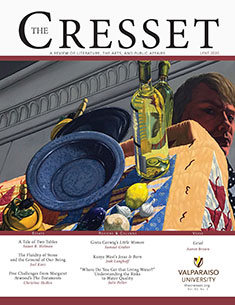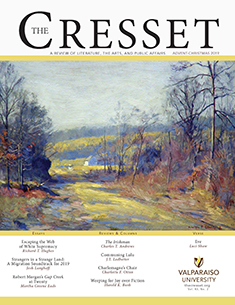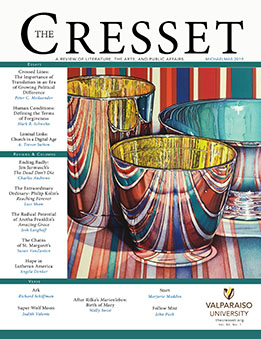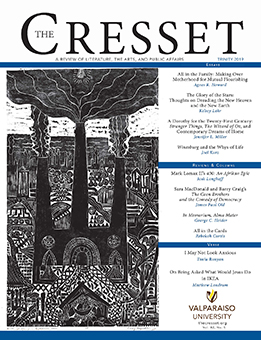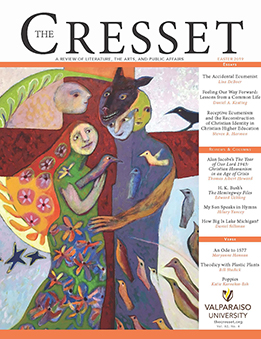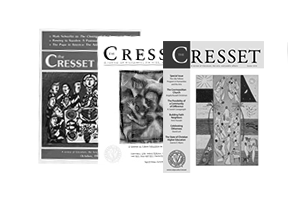Classical Reference and Artistic Resonance
in Cinema Paradiso
Suffering
is all a man can carry into death to give his Maker.
—Flannery
O'Connor
Your
problem pure and simple, Miz Hatthaway, is too much book larnin'.
—Jethro
Clampett
After passing my doctoral comprehensive exams and already in the midst of researching my Ph.D. dissertation, I made the radical decision to turn away from one life in order to embrace another. I dropped out of a graduate program at UCLA in order to enter the Iowa Writers' Workshop. A week after arriving in Iowa City, giddy with excitement but still battling second thoughts about what I had done, already intimidated by the awesome talent all around me, I attended an English Department cocktail party where by happenstance I fell into a conversation with a faculty member whose teaching specialty lay in the classics. I don't remember the initial details of our interchange, but I do remember that we were blithely convivial until the professor asked what I had come to the university to study. When I told him I planned to specialize in fiction writing, his manner changed abruptly and his declaration "Oh Lord, another would-be writer," made no attempt to hide his scorn. Before edging away from me, he added, "Don't you know that the only role left for us in the modern period is that of scholarship? All the stories were already told by the time Homer finished The Odyssey."
I wanted to snap off a nasty retort like, "Yeah, well somebody forgot to tell Shakespeare." But instead, I stared into my plastic cup of beer and felt a measure of my new life's elation congeal into an icicle of fear.
I thought of that incident anew when I first read in manuscript the text which precedes these reflections. "Toto's Tears and Ours" was originally a lecture which was delivered last spring by Valparaiso University Christ College Dean Mark R. Schwehn to a colloquium of graduating seniors. (If you have not read Dean Schwehn's remarks, you should do so before continuing here). One of the texts which Professor Schwehn assigned his class was Giuseppe Tornatore's Cinema Paradiso, and he challenged his students to use that estimable film as a context for reflecting on the sometimes competing demands of love (in its various, complicated manifestations), vocation, family, and religion. Indeed, Professor Schwehn sees the film itself as wrestling with these various issues and offering insights which the students ought to address.
Shortly later last spring, Dean Schwehn made his lecture available on the Christ College website and, using the e-mail discussion center the College maintains for its alumni, of which I am one, he invited three decades of Valparaiso honors college graduates to rent copies of Cinema Paradiso, read his analysis and post their own responses to the questions he asked of this year's seniors. Some few did, but the discussion never caught fire the way he hoped and I maintain it should have. Thus I am moving deliberations from an electronic to an old-fashioned print venue.
Ever the dutiful Christ College student (my former teachers will howl at such a self-characterization), I read Dean Schwehn's lecture with great interest and found it intensely stimulating. I think most readers will share my view that it is erudite, insightful, artistically probing and intellectually provocative. But some might share my reaction that the ambitions of its analysis exceed the reach of its evidence.
Before proceeding, I should establish the long-term personal context out of which this essay is written. Mark Schwehn and I were contemporaries at Valparaiso University in the 1960s, and we have been close friends all the years since. We have run footraces along the sandy beaches of the Pacific and have battled ourselves to exhaustion on tennis courts in five different states. We once staged a chess-by-mail match that raged on for six months. We have spent countless nights in one another's homes and done shared damage to dozens of bottles of Johnnie Walker. We have hiked the high Sierra together and fished mountain lakes side by side for rainbow trout. We have collaborated on several writing projects. And like all friends, we have not always seen eye to eye. He has never let me forget, for instance, the ridiculous position I took a decade ago after the Los Angeles Lakers won their fifth NBA championship in nine years when I contended that Magic Johnson was a better basketball player than Michael Jordan. Six Chicago Bulls' titles later, I know better. Throughout our long friendship, we have argued about sports and books, occasionally about politics and repeatedly about movies. The argument which appears in this more public forum is undertaken in that enduring spirit of profound respect and boundless affection.
Cinema Paradiso was finished in 1988 with a director's cut of 177 minutes and opened to a mixed critical reception in its native Italy at a running time of 155 minutes. Thereafter, writer/director Tornatore reworked the film, trimming another twenty percent. This tighter 123-minute version went on to win a Special Jury Prize at Cannes in the spring of 1989 and a year later captured the American Academy Award for Best Foreign Film. The picture opened widely across the United States in the spring and summer of 1990.
The narrative in Cinema Paradiso begins in the mid-1980s when Roman filmmaker Salvatore di Vita (Jacques Perrin) receives a phone call announcing that an old friend from his native Sicilian village of Giancaldo has died. Salvatore has not been back to Giancaldo in thirty years, but he determines to return for his friend's funeral, and as he does so he recalls his formative days as a young boy. Salvatore's deceased friend is an older man named Alfredo (Philippe Noiret), the longtime projectionist at Giancaldo's cinema, the Paradiso. As an impoverished pre-teen youngster whose father was killed on the Russian front in World War II, Salvatore, nicknamed Toto (Salvatore Cascio), sneaks away to the movies every night. His mother spanks him when he spends his family's milk money for admission, and thereafter Alfredo lets him watch the films from the projection booth. Gradually, Toto learns the projection business from Alfredo. And the youngster is sadly forced to employ this skill when Alfredo is blinded in a fire that burns the Paradiso to the ground. Toto saves the town its chief entertainment forum when he takes over for Alfredo once the cinema is rebuilt.
In his late teens, Toto (Mario Leonardi) falls for a young beauty named Elena Mendola (Agnese Nano) whose family has just moved to Giancaldo for her father's position as manager of the local bank. Eventually, Elena deems herself in love with Toto too, but in the end their relationship turns to heartache as her family moves away and the two young lovers lose touch. The turning point in Toto's life comes shortly later. Should he so choose, he could follow directly in Alfredo's footsteps and make a comfortable living as the projectionist at the Paradiso. Alfredo, though, challenges him to make more of himself. "I'm tired of talking to you," he says to Toto. "I want to hear others talk about you." In response, with some misgivings, Salvatore sets off for the world beyond Giancaldo where he ultimately becomes a major force in Italian film and television.
Professor Schwehn and I would not disagree that Cinema Paradiso strives to be about a variety of subjects. The film is the story of one boy's remarkable transition from a deprived youth to an adulthood of fame and fortune. This is a tale of accomplishment purchased at the price of essential rootlessness and the diminution of love. In several ways, Tornatore suggests that the demands of artistic ambition and amore are not compatible. When Elena finally comes to the projection booth to confess her love for Toto, the film he is showing breaks. The adult Toto never marries, loses all contact with Alfredo who has been his mentor and sees his family only when they travel to visit with him in Rome.
At the same time, the film is the story of the transformation of an isolated town as the homogenizing effects of television make all places more or less alike while at once the atomizing forces of geographic mobility and home entertainment chip away at shared experiences and diminish a sense of community. In Toto's youth, the school dunce is a full member of childhood society despite his stupidity. The whole town celebrates when one of their number becomes wealthy by winning the football lottery, and he repays their loyalty by stepping forward to rebuild the Paradiso when it burns.
Moreover, the picture is the story of a particular era of phenomenal change. It begins in the ravages of war and ends in unprecedented material prosperity. It is sharply marked by the declining influence of the church. At the outset the local priest censors every movie, unopposed in his notion that even scenes of kissing constitute pornography. But long before the end, the Paradiso is displaying nudity and highly suggestive scenes of lovemaking. In fact, the priest seems to manage the original Paradiso as a community service whereas the new owner's decisions affecting the Nuovo Paradiso are dictated by concerns about profits. In the politically turbulent period at the beginning, those who espouse communism quickly become social outcasts. By the end, the remarkable capitalist revolution has made such talk a mere historical curiosity.
Dean Schwehn and I would also agree (I think) that Cinema Paradiso treats its protagonist as a young man who trains for and enters something we might call the secular priesthood. He always maintains fond relations with Giancaldo's Father Adelfio (Leopoldo Trieste). As a child Toto serves as an altar boy. As a teen he replaces Fr. Adelfio in the confessional booth. Later, suffering from a broken heart, he is just the kind of young man who might well have turned to the priesthood in an earlier time. That's the second meaning of Fr. Adelfio's lament, "I was too late," when he misses Toto's departure at the train station.
In addition, Dean Schwehn and I would certainly agree that lessons in how to face the inevitable trials of living can be found in great works of literature (in which he and I would both include film). And he is absolutely correct in pointing up to his students that the virtues of family, friendship, duty, charity, honesty and work can easily fall into conflict, as they do in Cinema Paradiso.
Where Dean Schwehn and I would not agree is with his determination to place Cinema Paradiso in a detailed context of classical literature, specifically with episodes in The Odyssey and more generally with other cornerstones of the Western literary tradition. He begins this connection by discovering a Toto/Cyclops connection. His evidence? First, he points to a summer evening in which a teenaged Toto sits dockside pining for Elena who is out of town for the summer. Behind Toto, on a huge outdoor screen, Kirk Douglas stars in Mario Camerini's 1955 Ulysses. In an act of forlorn frustration, Toto slings a rock into the water at his feet. On the screen a short while later, the blinded, enraged Cyclops comes out atop a seaside cliff and hurls a boulder at the sounds of Ulysses' ship slapping against the waves below. Thinking back from what he terms "this clear identification," Professor Schwehn bolsters his Toto/Cyclops connection by recalling the teenager's "one-eyed vision" when he first spied Elena through the lens of his elementary motion picture camera.
From this point forward, Dean Schwehn makes two astonishing leaps. The first, like the several stages of the triple jump, comes in multiple long bounds. By associating Toto with Cyclops, the enemy of Ulysses, he somehow transforms Toto into Ulysses' archenemy Aeneas, the Trojan hero who in Virgil's epic poem Aeneid founds Rome as the successor to Greek domination of the Mediterranean. Stimulated by Toto/Cyclops/Aeneas' combined triumphs in Rome, Professor Schwehn thinks of Giancaldo's Cinema Paradiso and its rebuilt successor Nuovo Cinema Paradiso and rushes to invoke "two of Dante's works" which build "a Christian comedy on the ruins of antiquity." In surely his most breathtaking jump, Dean Schwehn declares, "On this reckoning, Elena is both Helen of Troy and Dante's Beatrice." From there he rushes on to locate Toto "at the confluence of Christianity and Classical cultures" by pointing out how in the conversation where Alfredo directs that Toto leave Giancaldo, the camera traces "a movement from the classical (the nautical imagery of the anchors) to the Christian (as the cross appears suddenly over Toto's head)."
In Professor Schwehn's second astonishing leap, near the end of his lecture, we find that Toto is no longer Cyclops/Aeneas, the conjoined enemy of Ulysses, but instead has become Ulysses himself. Here the Dean thinks of the facts that both Ulysses and Toto are gone from home for an awfully long time, twenty years for the former (ten years each for The Illiad and The Odyssey) and thirty years for the latter. And he observes that both have women at home involved with needlework, Ulysses' wife Penelope weaving by day and unweaving by night, and Toto's mother Maria (Pupella Magio) knitting as she waits for her son's return, her yarn unraveling as she goes to greet him at her door.
In reading and reflecting on the text of my friend's lecture, I was duly impressed with the breadth of his knowledge and the energy of his interpretation. I could not help thinking back, however, to another of my experiences as a graduate student at the University of Iowa. In Frank Conroy's fiction writing workshop one night, after the class reacted to one of my peers' short stories with notable restraint, I mounted a particularly spirited defense of the work in which I had found kernels of genius. As was his way, Professor Conroy heard me out patiently as I raved on, nodding, occasionally, as if in agreement. But when I finally stopped, he pursed his lips, shrugged tolerantly, and declared, eyes gleaming, "Rick, old boy, you're just working too hard."
In my view, Dean Schwehn is just working too hard. But I shall strive to work just as hard in refuting him. The Toto/Cyclops connection is rooted, I fear, far more securely in the recesses of the Dean's fertile imagination than anywhere in the text of Cinema Paradiso. When the movie in question includes footage from scores of other films from the likes of Jean Renoir, Charles Chaplin, Akira Kurosawa, John Ford, Luchino Visconti and countless others, why does Professor Schwehn choose to focus on clips from Camerini's Ulysses? Why not focus instead on John Wayne's leaving the security of home for a new life in the uncharted wilds of nineteenth-century Oregon?
I am initially puzzled at Dean Schwehn's discovering an image of Cyclops in Toto's photographing Elena. The very camera Toto uses shows a bi-ocular face, one round orb for the lens, another for the viewfinder. If writer/director Tornatore wanted Dean Schwehn's understanding of the film, why didn't he enhance it in any number of ways that were readily available? In order for freeloaders to see the outdoor movie without paying, a series of boats have been rowed alongside the dock where Toto sits thinking of Elena? Instead of having Toto lackadaisically flip a single rock into the water at his feet, why not have the teen fire rocks at the boaters to protect the investment of his employer. Then both Toto and Cyclops would be hurling stones at comparable targets.
And why instead of cutting directly to Cyclops from Toto's casting his rock away, does Tornatore instead have the boy lean back to muse upon how he would write a superior movie of his own life, one in which the summer would hurry by in a montage and he would then be quickly reunited with his girlfriend. As it is, Tornatore inserts a close-up of Toto's ruminating face before finally cutting to Cyclops ten full seconds later. I read the cut as registering an emblem of frustration. Toto cannot control the events of his life the way a director can control the events of a movie any more than a blind man can hit targets he cannot see. Thereafter, at least as Professor Schwehn has pursued the argument, if Toto is not Cyclops, then he cannot metamorphose into Aeneas, nor Elena ultimately into Dante's Beatrice. Moreover, if someone has to be Cyclops in this film, why isn't it Alfredo who is blind and who, like his one-eyed mythological ancestor, tries to keep the Toto/Ulysses hero from returning home.
Turning to Toto as Ulysses himself, Professor Schwehn makes much of Maria's knitting which unravels when Toto finally returns home. The Dean sees in that image Penelope's unweaving as a way of thwarting her aggressive suitors and therefore saving herself and her home for the return of her husband. There is a much simpler explanation. Earlier, when Alfredo tells Toto that he must leave Giancaldo, Alfredo rails against any notion of the small Sicilian village as the center of Toto's world. "You leave, a year, two years," Alfredo says, "when you come back everything is changed. The thread is broken." This shot of the unraveling yarn is the director's rejoinder, his affirmation that even after thirty years, the thread is still intact.
Furthermore, if Tornatore were striving for this Toto/Ulysses connection, why not drive the point home in a variety of ways directly accessible to the film's narrative flow. Upon Toto's return home, Maria shows him to his old bedroom where she's preserved many of his childhood icons. On the wall are a series of movie posters and star photographs. Clark Gable appears in Gone With the Wind, a fitting metaphor for the transformation of the Giancaldo Toto grew up in. But Kirk Douglas' photo is absent from that wall. In the forty-seven love scenes which end Cinema Paradiso, Gary Grant, Charles Chaplin, Errol Flynn, Rudolph Valentine, Gary Cooper and Jimmy Stewart all deliver smooches. If Professor Schwehn were right, shouldn't Douglas appear as Ulysses (last perhaps?) embracing his Penelope? He doesn't.
Given Dean Schwehn's other historic scholarly concerns, the one argument he might be expected to make about Toto is one he chooses not to. Toto's given name, Salvatore, means savior. His mother's name is Maria. His earthly father is absent as, after the Christmas story, Joseph is largely absent from the New Testament. His spiritual father, Alfredo, directs that Toto depart from Paradise to live an unmarried life in service of mankind by making movies. In this regard we mustn't forget that Fr. Adelfio manages the original Cinema Paradise and blesses its reincarnation. Tornatore pushes this association so hard that when the priest summons Alfredo's assistant to deal with a large, unruly crowd outside the theater, the assistant responds by ejaculating, "Good Lord," to which the director immediately responds by rack focusing to a close-up of Toto's ten-year-old face (and without, I might add, any intervening shots or a ten-second delay).
I haven't a clue why Professor Schwehn sees classical imagery in the anchors which stand in the foreground as Alfredo tells Toto he must leave Giancaldo. (To me, these untethered anchors represent the way in which Alfredo's speech has severed the mooring of Toto's connection to his birthplace.) But the Dean is wrong that in that scene a "cross appears suddenly over Toto's head." The cross is seen in the distance from the beginning of the long tracking shot that moves in a semi-circle from left to right. And pointedly it moves from a position over Alfredo's head to one over Toto's head, from father to son, a cinematic equivalent of Matthew 3:17: "This is my beloved son in whom I am well pleased."
I am far more confident that Tornatore intended these Biblical allusions than I am that he intended the several literary allusions Professor Schwehn promotes. But I am not altogether satisfied with their artistic merit. Toto may be literally a savior in that he bravely rushes into the burning cinema to save Alfredo's life. But we know of no ways in which Toto's adult life might be considered Christlike. Tornatore shows us sundry real film clips, but he imagines nothing for Toto's own work as a filmmaker. We are told about, rather than shown, his greatness, and we have no evidence one way or another to affirm or deny the moral or otherwise instructive nature of his films. His mother tells us that his adult life has been loveless. But we're not even sure of that. And we hasten to remember that though Jesus may not have known sexual love, he certainly did know the love of his disciples as well as that of others who were his followers. If Toto's work has touched people in an appropriately comparable fashion, we do not meet them. And without either exposure to the work or testimony from those who have been changed by it, Toto as Savior withers as an empty artifice. Savior of whom for what? This particular weakness is a central reason why I do not share Professor Schwehn's largely unqualified regard for Cinema Paradiso. On my honor roll, Richard Rush's The Stunt Man and Francois Truffaut's Day For Night both command higher rankings among movies about moviemaking and moviemakers.
But my resistance to Professor Schwehn's reading of and teaching about Cinema Paradiso transcends any list of the specific points on which we disagree. For I am concerned that by emphasizing the references he sees in the film to the works of Homer, Virgil and Dante he leaves two unfortunate impressions. First, his lecture may be read to imply that only by the most extensive familiarity with classical works of art may one truly understand and appreciate contemporary works of art. Second, he implies that contemporary art is truly impressive only insofar as it quotes from and builds analogues to its classical predecessors. Knowing Mark Schwehn as long and as well as I have, I don't think he believes either of these two things. And that's partly why I am taking him to task here.
Moreover, I fear that Dean Schwehn's lecture may have the opposite result of what I'm sure he intended. Respecting his intellect and pedagogical skills to the vast extent that I do, when I first read his reflections on Cinema Paradiso, I felt awestruck and intimidated. I had written about the film myself when it opened in the United States, and I had certainly seen nothing of The Odyssey about it. Yet, Professor Schwehn writes so well and so convincingly that I was initially certain that he must be right and I must have been a particularly inept critic in my own viewing of and reflections on the film. And if I felt that way, how must a group of college seniors, even Valparaiso's exquisitely gifted Christ College seniors, have felt when they encountered his insights. They almost certainly wouldn't have seen the things the Dean points to, and how easily they might believe that they couldn't. So though they might be stimulated, I fear they might feel defeated too. And that's the last thing a teacher wants to do to his students.
In that regard, as a teacher, I think we are always on safest ground by sticking to the demonstrable elements of the text before us. And had he done so, I think Professor Schwehn could have identified sundry elements of artistry in Cinema Paradiso that can be celebrated without striving to connect any of them to classical antecedents. If I were to teach a class on Cinema Paradiso, I would point out the various techniques that director Tornatore uses to enrich the meanings of his narrative. Take the bells, for instance: After learning from his mother's phone call that Alfredo has died, Toto spies wind chimes outside his window, the winds of change and loss blowing through his life. As his memory rushes back to his youth, those chimes cast striping shadows on Toto's sleepless face, and their tinkle becomes the tinkle of a bell in the hands of ten-year-old altar boy. Quickly the bells symbolize moral duty. Fr. Adelfio says to Toto, "If I don't hear the bells, I lose my place." Later, the priest indignantly rings his own bell to censor those portions of movies he regards as offensive. In a comic reversal, a character in a film on the screen at the Paradiso steps forward to ring a bell just as a couple in the audience are engaging in a shadowed act of sexual intercourse. The massive church bells in the town square call the parishioners to mass. And at dawn the morning after learning of Alfredo's death, bells are ringing as Toto rises to do his duty of returning home—going home so that he won't also lose his place!
I would emphasize the sophistication of Ennio Morricone's haunting score, so melancholy in the film's opening moments and again as the forty-one kisses flicker across the screen at the end, but at other times so hopeful and light as during the season of love that Toto enjoys with Elena. And I would point out the black and white checkerboard floors in both Maria's home and in both incarnations of the Paradiso and discuss the way in which these contrasting checks, which appear in a dissolve just as Toto begins to shoot his first film, represent the foundations of Toto's success and the roots of his melancholy. And I would note the series of subtle ways that Tornatore enhances the paternal nature of Alfredo's role in Toto's life: In the early minutes, Alfredo says of Toto's absent father, "He had a mustache just like mine." When Maria scolds the ten-year-old Toto, she turns her wrath on Alfredo the way any angry wife would upon a permissive husband. And at the end, as the funeral goers stand before the condemned theater in the town square, the marquee, missing its R, reads, "Pa adiso," the simplest of anagrams for "goodbye father."
I would discuss in some detail the key issues of class and ethnicity that Cinema Paradiso touches ever so subtly but so critically. Toto is black-haired and olive-skinned. Elena is blue-eyed and fair, her light brown hair almost blond, and though she may not harbor ethnic prejudice herself, her family almost certainly does. Alfredo warns Toto explicitly, "the blue-eyed ones are always the worst." Toto's family is desperately poor whereas Elena's banker family is upper middle class. As a teen Toto drives a ratty car which breaks down on a date, and he and Elena have to be rescued by her obviously displeased father. Her face registers the embarrassment of her having been caught at something (dating Toto) her father has warned her against. Toto first sees Elena at the station where he will later depart Giancaldo not to return for three decades. She will be a catalyst for transition in his life but never an enduring component. We see that the critical differences in the two young people doom their relationship from the outset. That's why Toto is literally behind bars when he first sees Elena; he's in an ethnic and class cage from which he can never escape. But Toto is love struck and does not see Elena clearly. His film of her is never quite in focus. Toto is, of course, like the soldier in Alfredo's story who stood outside the window of a princess for ninety-nine nights. Toto makes the soldier look like a slacker. Pregnant with love for her, he stands outside Elena's window for nine months. Alfredo says he doesn't understand the meaning of his own story. But we do. Like the princess who dared the soldier to prove his love by suffering, Elena is ultimately unworthy of the boy who loved her so completely.
And I would talk at some length about the lessons Cinema Paradise strives to offer about the nature of parent/child relations. This is the film's greatest strength, I think. There can be no question that Alfredo loves Toto like the son he never had. Like a father he doesn't want his son to repeat his own mistakes. Alfredo began working as a projectionist when he was ten years old. He never finished grammar school, a decision he regrets into middle age. That's why he won't hear of Toto's following the same path. He insists that Toto leave Giancaldo in substantial part because he knows that working at the Paradise would prove too easy but too unfulfilling. He also wants Toto to leave Giancaldo so as to distance himself from the painful memories of Elena which might inhibit his development. All of this is presumably good advice. But like other parents Alfredo gives bad, arguably harmful advice, as well. Parents sometimes do wrong things to their children, but if they do them out of love, then their right to forgiveness is never in question. Alfredo pushes Toto a step too far. He orders the boy to leave Sicily and never return. This last command is selfless because it means Alfredo will lose contact with Toto. But it is also unnecessary and wrong. Alfredo thinks that Toto needs to break the threads that bind him to Giancaldo, but as Maria's unraveling yarn at the end underscores, the thread is stretched but never broken. Even Alfredo himself understands this at the end. He knows Toto will come home for his funeral. That's why he directs his wife to give Toto the film clips. And as much as they are anything else, those closing kisses are the lips of a loving parent on the forehead of a cherished child.
In conclusion, I should address that question which Dean Schwehn asked of his colloquium: What is the meaning of Toto's tears at the end of the film? Pondering this question I recall the blinded Alfredo's lament about the development of film which does not burn: "Progress always comes too late." As Toto watches the film clips of lovers embracing and kissing, the Paradise of his youth is gone, this house of dreams demolished for something as utilitarian and mundane as a municipal parking lot. Youth is a paradise that by its very nature cannot endure. As Toto watches the lovers kiss, he can only be thinking about his own youth spent in a projection booth with a man he loved, doing together something they both loved. Hence, Toto's emotions are profoundly mixed, tears falling over the smile of precious memories. In the wonder of youth, even in the impoverished circumstances that were Toto's plight, we know a happiness of boundless potential that we will not, cannot, sustain through the inevitable suffering of life. However slight for those of us most blessed, born among other ways of unwanted choices, that suffering will diminish our options, will dim our horizons, will leave indelible scars, even when our dreams come true,
Dean Schwehn responds:
Let me begin by saying how grateful I am to my good friend Professor Rick Barton for both extending the length and enlarging the depth of the conversation about Cinema Paradiso that I had hoped to initiate by the lecture. I hope that his critical response and my rejoinder to it will inspire many readers to view or review the film and to think about the many questions that it raises. And I should note first of all that Professor Barton and I are for the most part in agreement as to what the film is about. Indeed, his own reading of the meaning of Toto's tears is not very far at all from one of the several possible readings that I consider and endorse during the course of the lecture. And we agree absolutely that Toto and we, if we have understood the film at all, are in the grip of powerfully mixed and sometimes conflicting emotions when Toto's film and our film conclude together.
There are many other crucial parts of the film that Professor Barton and I interpret in similar ways, and I shall attend to these as I proceed, but let me turn directly to what I take to be the principal differences between our readings of the film. He believes that I am "working too hard" as I strain to find classical allusions many of which are not really in the film, much less in the mind of the film maker as he was making the film. And this is doubly troubling, because, first, it needlessly intimidates the students, and second, it leads me to ignore more plausible and revealing allusions of the sort that Professor Barton himself develops. So much of my reading that depends upon classical allusions is not just wrong; it is insidiously wrong.
Before taking up some of the particulars here, let me advance two more general points that will go some distance to explain if they do not altogether justify my extensive references to classical allusions. First, the context of the lecture was a specific class composed of specific students who had read over the course of their years together in Christ College a number of books together, many of which were classic texts. The lecture itself provides some of this context, reminding the students of works like Plato's Meno that they read as freshmen and Gilbert Meilaender's work on friendship and vocation that they read immediately preceding the showing of the film. So some of what Professor Barton takes to be "forced" allusions are instead contingent connections that are in part a function of common experiences. Let me therefore concede at once that if I were to have been lecturing in a course on Italian cinema, or on the works of Tornatore, or had I been writing, as Professor Barton does, a weekly film column, mine would have been a different piece of work altogether. Certainly the classical materials would not have figured so prominently.
Still, though this contextual consideration may explain, it surely does not justify by itself the use of these allusions to unpack the meaning of the text of the film. The first thing we try to teach Christ College students is how to find warrants for their interpretations in the texts they are studying. Special pleading of the sort offered in the preceding paragraph just won't do by itself. I therefore come now to my second point, and it too is about context, this time the context of the film itself. I believe that the classical world of Virgil and Homer and the medieval world of Dante is just "there" for Italian audiences in roughly the same way the the symbolic geography of the West and the "Western" are just "there" for American audiences. Thus, one does not have to invoke anchors (as I did) to defend the view that the scene of an old, blind mentor at the seashore sending his young (figurative) son away reverberates through volumes of classical literature and therefore through thousands of minds steeped and dyed in such literature. One might think of Athena disguised as Mentor sending the young Telemachus off in search of Odysseus in the Odyssey, or of Achilles' mother Thetis presenting her son with his two possible futures in the Iliad, etc. etc. It is almost a set piece, and one need not demonstrate in some mechanical fashion that there is a one-to-one correspondence between Toto and Telemachus or Alfredo and Mentor or Teiresias in order to make a case for this. Places and spaces conjure up networks of associations for people. Sending someone away at a seashore has for Italians something of the same resonance as riding off into the sunset has for citizens of the US. The meaning may not be precise and univocal, but the range of associations and sentiments conjured up are not infinite either. One has a richly controlled response evoked by the setting itself.
So my second point would be that the whole film simply breathes the atmosphere of the classical world as much as it breathes the atmosphere of Italian cinema. This general atmosphere, sometimes very palpable as in the scene I just discussed, warrants the activity of seeking and often finding the kinds of more exact classical allusions I discuss. It would be tedious for me to take each and every one of Professor Barton's points up in detail. Some of them, I think, are really not finally resolvable. I found his efforts to undermine my reading of the scene at the outdoor theatre amusing in part because, had the director actually done what the essayist Barton proposes (arranging for the adolescent Toto to throw stones into passing boats to make the parallel between Toto and the Cyclopes exact and unambiguous), the film reviewer Barton would have been the first to complain that such a move was archly condescending to audiences who could have gotten the point had it been made much more subtly (rather like I think the point was in fact made). As for the Christian allusions that he discovers in the film, they are surely there, and I am grateful to him for pointing all of them out. I had missed some of them. But unlike Professor Barton who finds these finally unsatisfying because the character does not measure up to his own prototype, I find them exactly right because for me the character is neither Christian nor pagan, but a strange combination of the two that yields the kind of conflicted, postmodern hero that Toto becomes. We're back once more at the seashore and the confluence of two worlds. And notice that even if we admit, as I gladly do, that the film's references to other films may be even more important than its references to classical literature, this is most definitely not true at the seashore. For there, Alfredo speaks in his voice, no longer quoting characters from films, and this point is made explicitly. The larger and more remote fields of allusion envelop and supersede the narrower one in this scene.
I am a bit less sure of what to say in response to Professor Barton's "calling me to task" for the classical allusions on the grounds that such a move intimidates students. I gather that the grounds for the complaint mostly disappear if the classical allusions are really present in the film. But I am not quite sure about this. Professor Barton proceeds to show what he, with his exceptionally well-trained eye, would have done if he had been delivering the lecture. And here I had much the same reaction to his reading as he claims he initially had to mine: much of what he noticed had escaped me. But I felt more edified than intimidated by his observations. Professor Barton just generally notices more than I do in a film. What seems self-evident to him seems (often) revelatory to me. I doubt that he would withhold these often very telling readings on the grounds that his students might not (yet) be ready to discover them on their own. The power of any good reading is often registered by its seeming obvious once it is presented. But if it had really been obvious, the reading would not have been necessary. I think this principle applies just as much to allusions as it does to tracking shots and scene composition. And what are we to make of Professor Barton's observation that the "marquee, missing its R, reads, 'Pa adiso,' the simplest of anagrams for 'goodbye father.'" So Professor Barton glibly and blithely notes anagrams in a foreign language even as he reproaches me for being intimidating! Surely he writes partly in jest. And in all candor, some of the old competitive spirit that has always added extra zest to our friendship is probably at work here on both our parts. Having admitted that some of the things I saw had eluded him, he cannot resist pointing out things that he knows I did not see in such a way so as to suggest that any dunce should have seen them. Intimidation, like beauty, is in the eye of the beholder. Especially when it comes to film.
When Professor Barton and I get together near the end of the millennium, we will at some point argue this out scene-by-scene. I am sure about those knitting needles and Penelope, but he is surely right about the earlier explicit reference to the thread, etc. But the larger point that we have made together here is this. Works like Cinema Paradiso are overdetermined and polysemous. Getting at their meanings and their truths really does require this kind of joint endeavor that is so typical of Christ College students and alumni. He's right to include points about class and ethnicity. I was right, given the restricted scope and occasional purposes of the lecture, to leave those points for another time. And we should all be glad to be reminded by Professor Barton of the hauntingly beautiful and wonderfully varied score (at least four distinct and memorable motifs) composed by Ennio Morricone. Some of our most contested readings will lead us both to new places: we'll never see the "same" film again. But we will never see just any film. This one, we agree, is centrally about the poignance of the need for human commitment and the concurrent discovery that all serious commitments can be sustained only with the sacrifice of other equally serious and precious ones. This is another dimension of our finitude, discovered anew in each generation as we are brought to the remembrance of things past.


